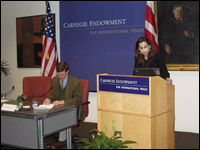Registration
You will receive an email confirming your registration.
IMGXYZ670IMGZYXOn April 16, 2007, the Carnegie Endowment hosted Pakistan People’s Party Representative Sherry Rehman. George Perkovich, Vice President for Studies in Global Security and Economic Development at the Carnegie Endowment, moderated the event.
Speaking on “Pakistan Today: Policy Challenges and U.S. Engagement,” Ms. Rehman highlighted three phenomena occurring in Pakistan as the 2007 elections draw near: first, the current crisis in public opinion; second, the Pakistan-U.S. relations; and third, the myth that Gen. Musharraf is the key to stability within the country.
Ms. Rehman pointed out that there is a public opinion crisis currently mobilizing the street in Pakistan. She believed that the arbitrary and unlawful sacking of Chief Justice Chaudhry that has turned out to be the final straw for the public. Ms. Rehman emphasized that this is the first time that the country's elites – including top lawyers and judges – have taken to the streets, effectively showcasing the deep-rooted frustration among many Pakistanis.
She further argued that it is time to re-examine the limits of joint Pakistan-U.S. strategic goals in the region in concert with a regime that is unable or unwilling to execute stated security objectives. Counter-terrorism objectives can never be successfully achieved, she asserted, if the U.S. relies on a regime dependent for its political survival on the religious right.
Drawing upon history to assert that the internal stability of Pakistan is contingent on democracy, Ms. Rehman regretted that U.S. security goals are almost always seen as a trade-off with democracy. Washington's embrace of Pakistan only translates into tangible gains primarily for military regimes, instead of education and health of the people. She concluded that dictatorship is not the answer for the pursuit of anti-terrorism objectives; rather, it is part of the problem, especially in countries like Pakistan.
Ms. Rehman forcefully rejected the notion that General Musharraf is the sole political leader capable of maintaining state stability against a tide of fundamentalist reaction. Pointing out that religious parties could boast of only 11 percent of the vote despite having been made mainstream by the current military regime, Ms. Rehman emphasized that no Pakistani, with the possible exception of the religious right, has issue with the current agenda of ridding Pakistan and its neighborhood of terrorism and extremism.
Speaking about Pakistan’s border areas, she said that the nationalist secular allies of the PPP in both the Northwest Frontier Province and Baluchistan were being marginalized. The result: Islamisation of Pakhtun nationalism that in turn has created a Deobandist support base stretching from Kandahar to Quetta through Kabul and Peshawar, with significant penetration in urban Karachi.
Another symbol of the growing confrontation between religious militancy, hitherto on the fringes, with mainstream, moderate Pakistan has been the recent Lal Masjid episode, where armed extremists took over the seminary the heart of the federal capital. The state's unwillingness to act firmly to root them out, she said, raises questions not about the state’s capacity to deal with fundamentalists in the heart of major cities, but about the possible tacit complicity of a regime that claims to be the only bastion between stability and certain fundamentalist chaos.
It is imperative, Ms. Rehman concluded, that Pakistan holds free and fair elections this year. Stating that PPP leader, Ms. Bhutto, plans to return to Pakistan for the 2007 elections, she laid down her party's demands for an election run under the auspices of an impartial caretaker government, controlled and supervised by a truly independent election commission, open to the participation of all political parties and political party leaders who are allowed to return from exile, and monitored by teams of international observers watching both the voting and counting of ballots.
During the Q&A, Ms. Rehman denied knowledge of any ongoing consultations for a deal between Musharraf and Bhutto, even though she did not explicitly reject such a possibility. She reaffirmed her party’s demands for supremacy of democratic institutions and a constitutional restoration of a parliamentary system. Stating that the PPP was open to dialogue with any political entity, she believed that the military should, in any case, go back to its primary duty of protecting the country against external threats. She drew reference to some Latin American countries where the army basically receded from the political sphere, while being allowed to maintain their economic interests, suggesting that a similar process could occur in Pakistan.
Acknowledging that strong macro-economic growth had taken place in recent years, Ms. Rehman lamented that poverty remained endemic, and the fruits of development had not percolated down. While acknowledging the enormous difficulty of the task, she claimed that the PPP could control the FATA region and believed that the Political Parties Act could take power away from the maliks. She refused to speak about potential discontent with Musharraf within the military, but nevertheless stated that it was clear that many senior and junior officers wanted to return to their primary jobs.
Ms. Rehman also drew attention to a “soft Islamic revolution” in Pakistan that was seeing the increasing importance of religion in people’s lives. However, she believed that this was simply part of a global resurgence of religion. In Pakistan, she informed the audience, the shift towards religion, occurring across different strata and even within the military, was primarily a result of a search for identity.
Asserting that Musharraf’s regime was feeling fairly cornered right now, Ms. Rehman explained that recent threats by Musharraf’s regime of ending their partnership with the U.S. were an attempt to bolster its domestic position. She provided assurances that a civilian government in Pakistan would also support the U.S.-led war on terror. Pointing to positive signals emanating from the U.S. Congress, especially Democrats, she argued that changes in the mindsets in Washington bode well for greater U.S. support for free and fair elections in Pakistan.
This event report was prepared by Anirudh Suri, Junior Fellow in the South Asia Program at the Carnegie Endowment.
